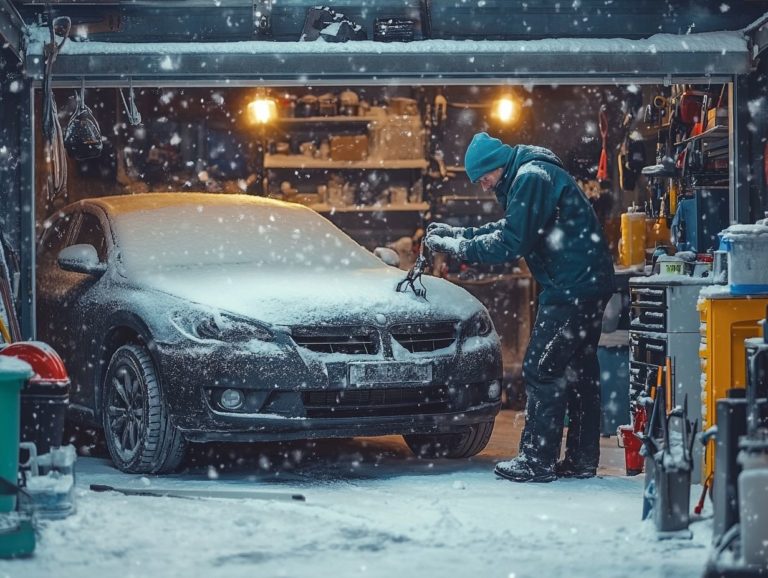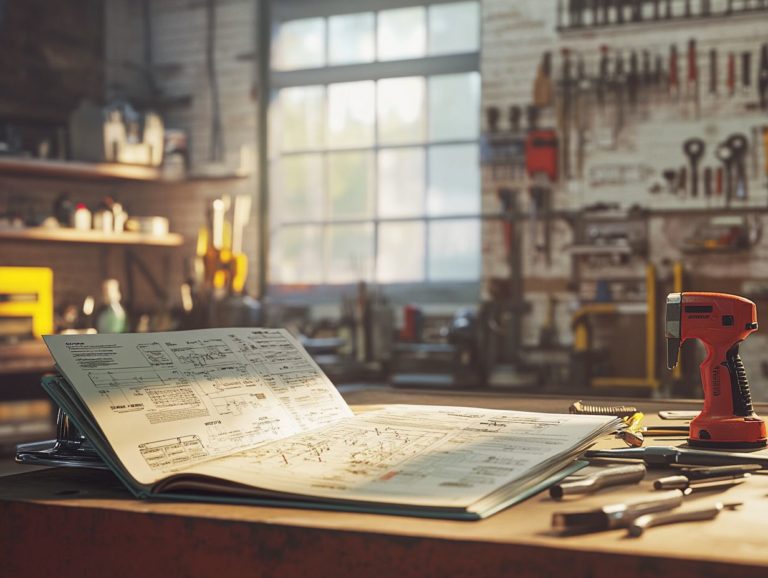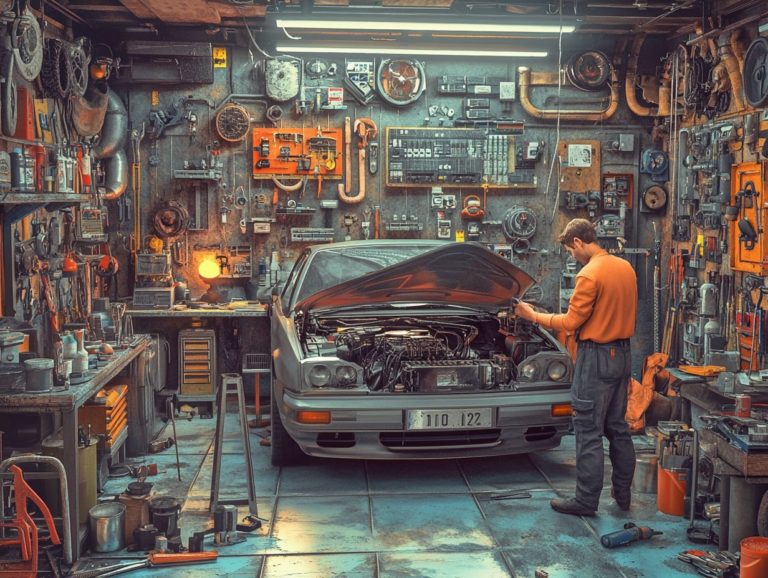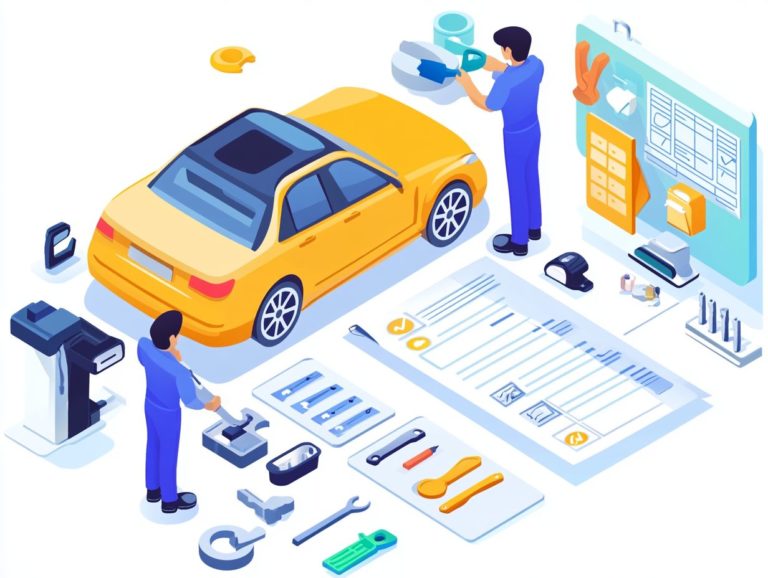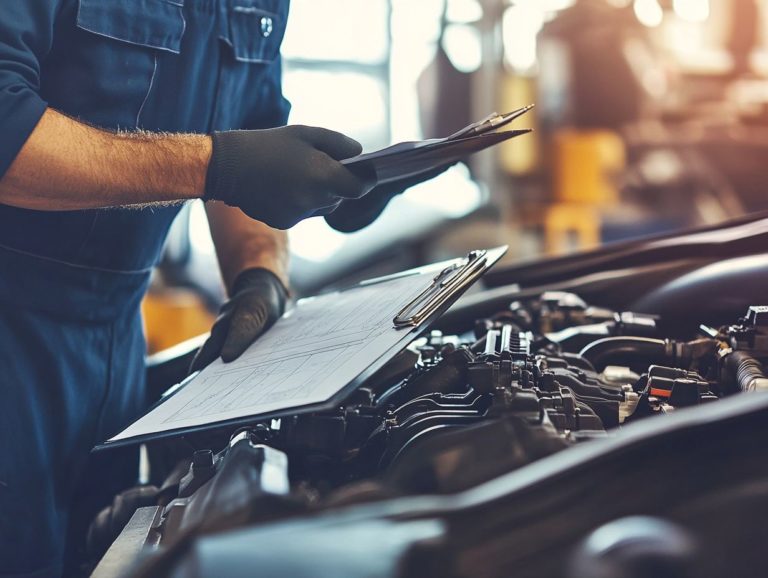A Beginner’s Guide to Car Maintenance
Car maintenance is crucial for ensuring the longevity and reliability of your vehicle.
Regular upkeep not only enhances performance but also prevents those costly repairs that can sneak up on you. This guide walks you through essential tasks, from oil changes and tire care to more advanced maintenance like brake checks and engine tune-ups.
You’ll find a list of tools required for DIY jobs, insights on when to call in the professionals, and tips on creating a maintenance schedule that keeps your car running like a dream.
Whether you’re a seasoned car enthusiast or a first-time owner, mastering these essentials will empower you with confidence on the road.
Contents
- Key Takeaways:
- Basic Car Maintenance Tasks
- Advanced Car Maintenance
- Tools and Equipment for Car Maintenance
- When to Seek Professional Help
- Creating a Car Maintenance Schedule
- Frequently Asked Questions
- What is car maintenance?
- Why is it important to regularly maintain your car?
- What are some basic car maintenance tasks that beginners should know?
- How often should I get my car serviced?
- Do I need to have any special tools or knowledge to perform basic car maintenance?
- What are some signs that my car needs immediate maintenance?
Key Takeaways:
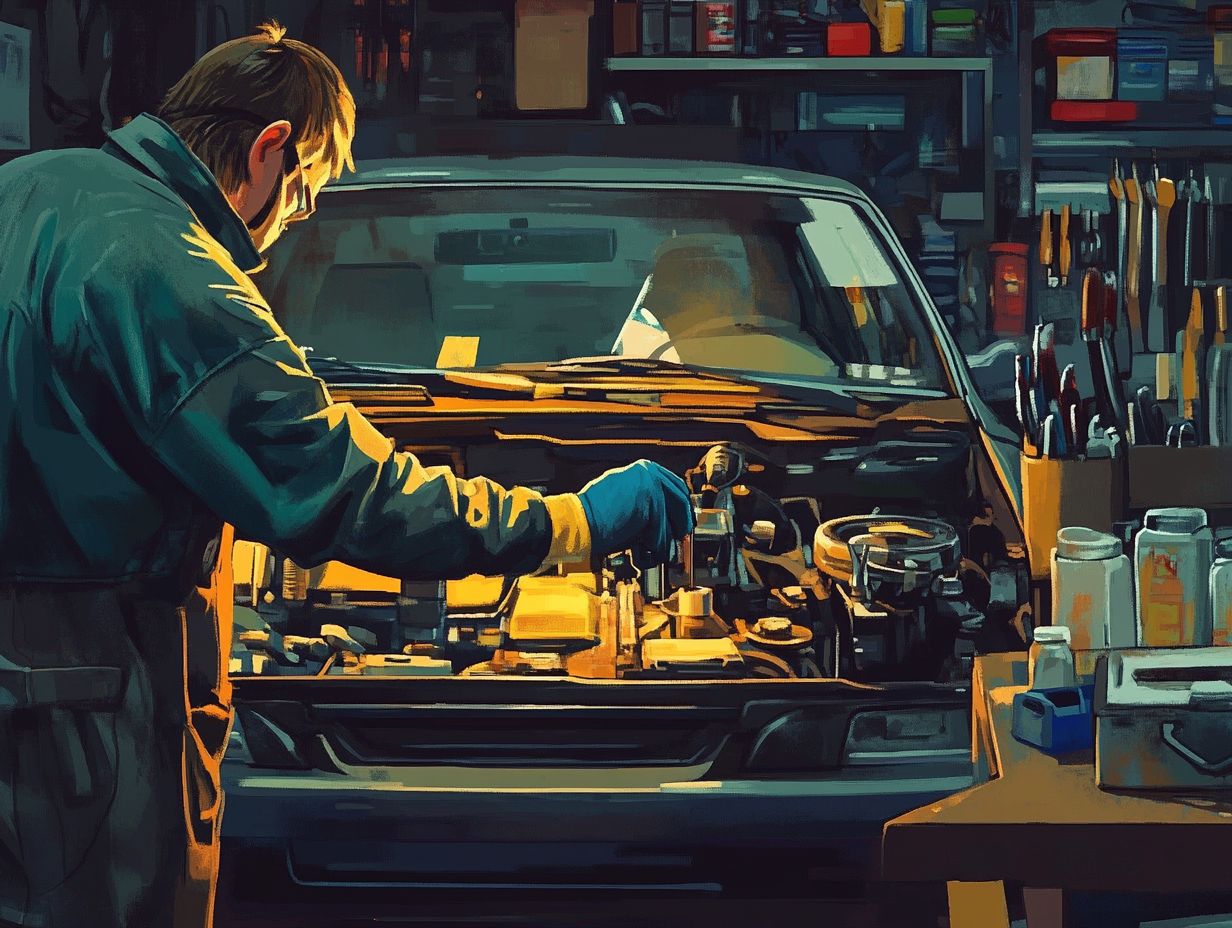
- Regular car maintenance is crucial for safety, longevity, and performance of your vehicle. Skipping maintenance can lead to costly repairs or accidents.
- Basic maintenance tasks like oil changes, tire checks, and battery care can be done at home with simple tools and save you money in the long run.
- While some advanced maintenance tasks like brake maintenance and engine tune-ups require professional help, it is important to know when to seek help and not neglect these important tasks.
Why is Car Maintenance Important?
Car maintenance is essential for ensuring the safety and performance of your vehicle. Regular upkeep can significantly enhance its reliability, and to learn more about crucial practices, check out what every driver should know about maintenance, which can help extend the lifespan of its various components.
Neglecting routine tasks like oil changes, tire rotations, and brake inspections can lead to diminished performance and increased hazards on the road. A well-maintained engine not only boosts power but also improves fuel efficiency, ultimately saving you money at the pump.
Keeping a close eye on the cooling system and battery can help prevent overheating and electrical failures, ensuring your vehicle runs smoothly. Investing time in preventive measures ensures a more pleasant driving experience, increases your vehicle’s resale value, and enhances its overall longevity.
Basic Car Maintenance Tasks
Basic car maintenance tasks are crucial for ensuring your vehicle operates safely and smoothly. To help with this, referring to the ultimate car maintenance checklist can provide a range of checks and replacements that every car owner should commit to regularly.
Oil Changes
Regular oil changes are essential for your car’s maintenance, ensuring that the engine runs smoothly and is safeguarded against wear and tear.
By sticking to a consistent oil change schedule, you can greatly improve your engine’s health and extend your vehicle’s lifespan. Most manufacturers suggest changing the oil every 3,000 to 7,500 miles, depending on the type of oil you use and your driving conditions.
Checking your oil levels is a breeze; just pull out the dipstick a simple tool used to check oil levels give it a quick wipe, and reinsert it for an accurate reading.
Understanding the various types of oil like conventional, synthetic, and high-mileage options enables you to choose the best fit for your vehicle’s needs, all while promoting optimal fluid management.
Tire Maintenance
Keep your ride smooth and safe tire maintenance is essential for ensuring your vehicle performs at its best and keeps you safe on the road. This necessitates regular checks of tire pressure and tread depth to avert potential accidents.
Proper tire pressure isn t just about saving on fuel; it’s pivotal for a smooth, comfortable ride. To achieve this, you should use a reliable tire pressure gauge to measure inflation levels, ensuring they match the specifications set by your vehicle’s manufacturer typically found on a sticker inside the driver s door.
Inspecting tread depth is equally important; sufficient tread is vital for maintaining traction and handling, especially in wet or slippery conditions. Neglecting this can lead to compromised safety and diminished performance.
By prioritizing these checks, you can significantly enhance your driving experience while reducing the risk of tire blowouts or loss of control.
Battery Care
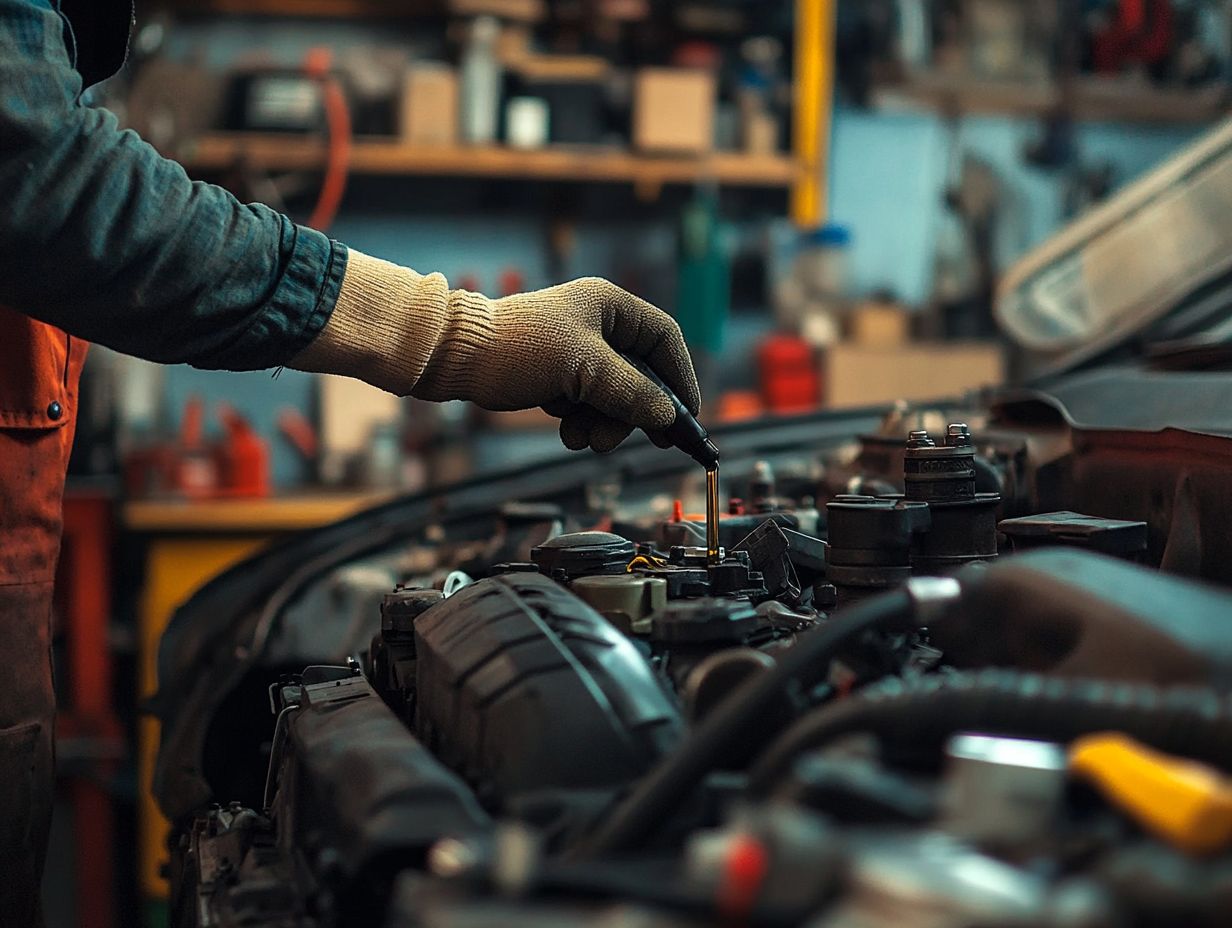
Taking care of your battery is crucial for reliable engine starts and performance. A well-maintained battery means fewer headaches on the road.
Inspect your battery terminals regularly to spot any wear or damage. Watch out for corrosion; that annoying white residue can block electricity flow and lead to frustrating starting issues.
To clean, use a mixture of baking soda and water. If your battery shows signs of aging after three to five years, it s time for a replacement to keep your car running smoothly.
Advanced Car Maintenance
Advanced car maintenance involves thorough inspections and repairs that go beyond basic tasks. It focuses on critical components such as the engine and brakes to ensure your vehicle operates at its peak performance and maintains the highest safety standards.
Brake Maintenance
Brake maintenance is a must for your vehicle’s safety. It requires regular inspections and timely replacements to guarantee reliable stopping power.
Neglecting this crucial aspect can diminish performance and increase the risk of accidents. Inspect your brake pads often and look for signs of wear like thin padding, cracks, or uneven surfaces.
If you hear squeaking or grinding noises, that s your cue it might be time for a replacement. Maintaining your brake fluid levels is equally important.
Low fluid can lead to brake failure, which is the last thing anyone wants. Regularly check and replace this fluid as needed to enhance safety and improve performance, ensuring your vehicle responds effectively when it s time to stop.
Engine Tune-Ups
Engine tune-ups are vital for optimizing your vehicle’s performance and ensuring maximum engine efficiency.
This process includes a comprehensive inspection of key components like spark plugs, air filters, and fluid levels essential for your car s smooth operation.
Technicians evaluate spark plugs to identify wear or buildup that might impede ignition. Clean filters facilitate improved airflow and fuel efficiency.
Keeping a close eye on fluid levels ensures your engine remains well-lubricated and cool, preventing overheating and costly repairs.
Regular tune-ups boost your vehicle s performance and extend its lifespan. For any car owner dedicated to maintaining peak performance, investing in these tune-ups is a savvy choice.
Tools and Equipment for Car Maintenance
Equipping yourself with the right tools and equipment is crucial for effective car maintenance. Following the best practices for new car maintenance ensures that you can tackle both basic and advanced tasks with confidence and ease.
Essential Tools for DIY Maintenance
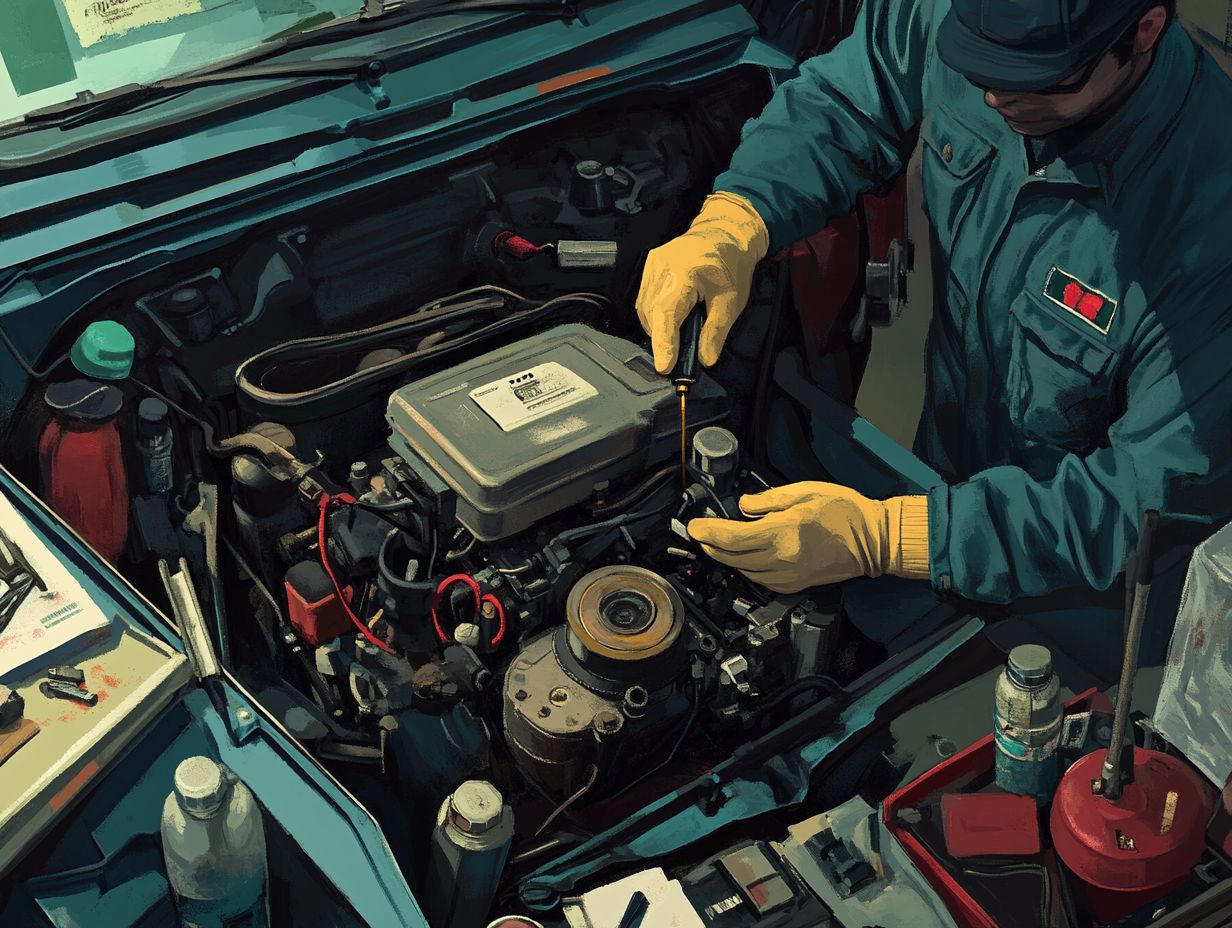
Essential tools for DIY maintenance encompass a range of items that enable you to conduct inspections and repairs efficiently and easily.
These tools are vital for keeping your vehicle running smoothly and ensuring it remains safe on the road. Oil filters are essential for maintaining engine health by effectively removing contaminants from the oil.
Having wrenches in various sizes allows you to easily loosen and tighten bolts, making tasks like changing the battery or replacing spark plugs much more manageable.
Gauges are crucial for checking tire pressure and fluid levels, helping you ensure optimal performance. With these essential tools at your fingertips, you can approach repairs confidently and significantly enhance your vehicle’s longevity.
When to Seek Professional Help
Knowing when to seek professional help is vital in car maintenance. Certain repairs and inspections demand expert knowledge and specialized tools.
If your vehicle starts making unusual noises, displays persistent warning lights, or encounters significant performance issues, consult a qualified technician immediately. Advanced diagnostics often involve complex systems like the engine management system or transmission, which require expertise and the right diagnostic equipment.
Routine maintenance tasks, such as brake inspections or tire alignments, can be easily overlooked without a seasoned professional. Engaging experts ensures that repairs are done correctly and safely, prolonging the life of your vehicle and ultimately saving you costs in the long run.
Creating a Car Maintenance Schedule
Establishing a comprehensive car maintenance schedule is crucial for you as a vehicle owner. It ensures that all necessary tasks are carried out promptly, significantly enhancing both safety and performance. Utilizing essential tools for DIY car maintenance can help make this process even easier.
How Often to Perform Maintenance Tasks
Understanding the right frequency for maintenance tasks is key to keeping your vehicle in top-notch condition and avoiding costly repairs.
By following recommended intervals, you can save yourself from unexpected breakdowns and hefty repair bills. For example, schedule oil changes every 5,000 to 7,500 miles for engine longevity, while tire rotations should occur every 6,000 to 8,000 miles for even wear.
Regularly checking essential fluids like coolant and brake fluid enhances your vehicle s safety and efficiency. Neglecting these tasks puts your car’s reliability at risk and can lead to decreased fuel efficiency and lower resale value.
Keeping Track of Maintenance Records
Keeping track of maintenance records is essential for you as a vehicle owner, allowing you to monitor the upkeep and performance of your vehicle over time.
A well-organized log of service activities provides valuable insight into routine tasks, such as oil changes, brake inspections, and tire rotations. This documentation paves the way for timely interventions that can save you from costly repairs later.
Regularly reviewing your historical data helps identify patterns to inform your future maintenance decisions. This proactive approach ensures that essential services are not overlooked and that replacements, such as filters and belts, occur at the right intervals.
Moreover, maintaining consistent records can significantly enhance your vehicle’s resale value; prospective buyers appreciate a documented history of care and diligence.
Frequently Asked Questions
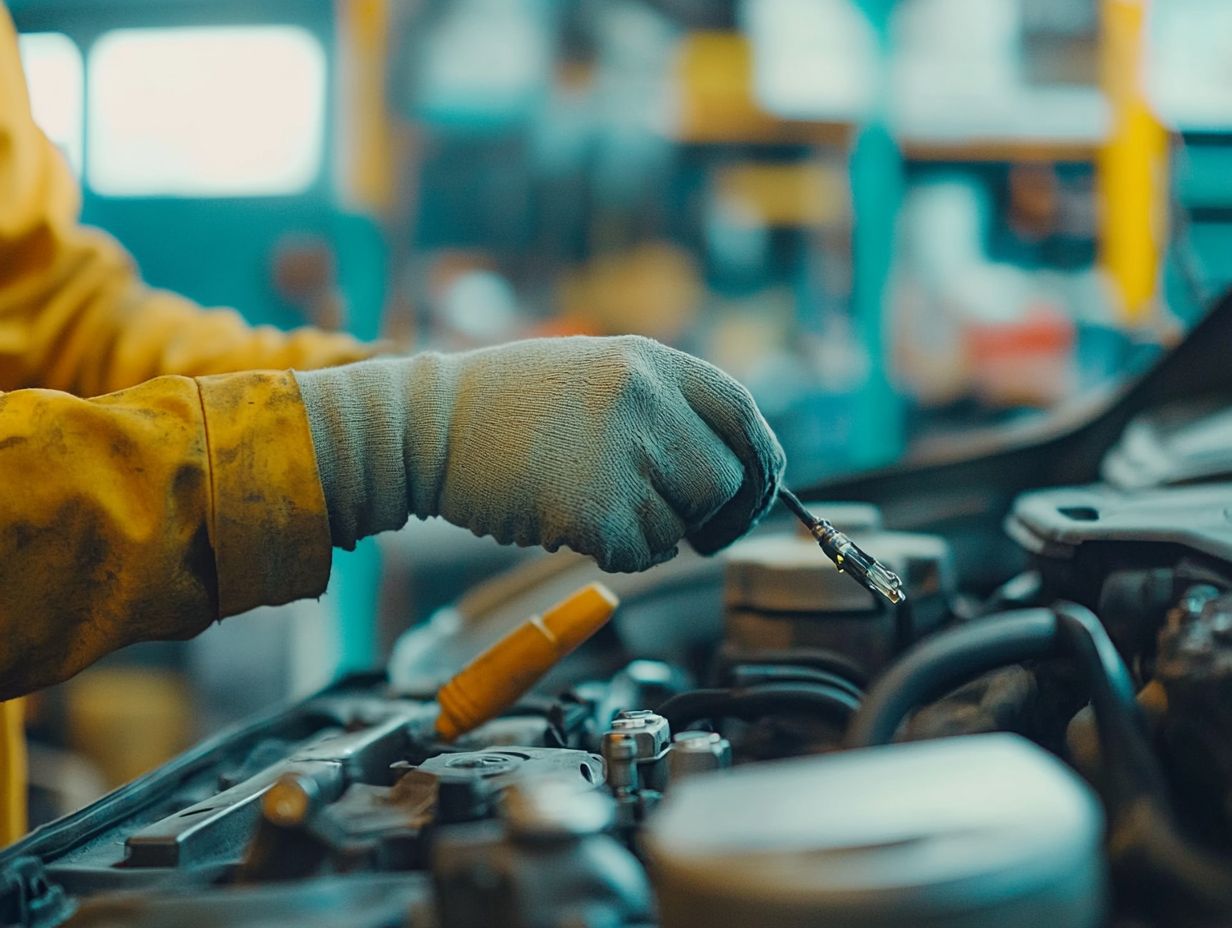
What is car maintenance?
Car maintenance refers to the routine upkeep and servicing of a vehicle to ensure its optimal performance and longevity.
Why is it important to regularly maintain your car?
Regular car maintenance helps prevent breakdowns and costly repairs, improves safety and fuel efficiency, and extends your vehicle’s life. For a comprehensive overview, refer to the essential maintenance checklist for new cars.
What are some basic car maintenance tasks that beginners should know?
Basic car maintenance tasks for beginners include checking and changing the oil, topping off fluids, inspecting and replacing filters and belts, and regularly checking tire pressure and tread depth. For more detailed advice, refer to the top 10 car maintenance tips for beginners.
How often should I get my car serviced?
Aim to service your car every 6 months or 6,000 miles, whichever comes first. However, this may vary based on your vehicle’s make and model, so it’s best to follow the manufacturer’s recommended maintenance schedule.
Do I need to have any special tools or knowledge to perform basic car maintenance?
No, basic car maintenance tasks can be done with simple tools like a jack, wrench, and socket set. While a basic understanding of your car’s components is helpful, you can also refer to a comprehensive guide on common car repairs for assistance.
Start your car maintenance journey today!
What are some signs that my car needs immediate maintenance?
Keep an eye out for signs that your car needs immediate attention! Unusual noises, vibrations, leaks, warning lights on the dashboard, and poor gas mileage are all indicators.
Don’t wait! Tackling these problems right away can save you from bigger issues down the road.

